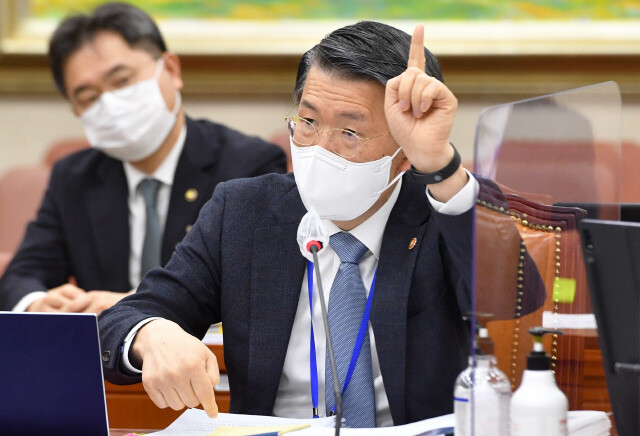Amendment to the Electronic Financial Transactions Act
To collect’personal transaction and charge details’
Confronting “private information”-“check only in case of incident”
The interpretation of the rights fight for customer protection

Finance Commissioner Eun Seong-soo answers a question from a member of the Political Affairs Committee held at the National Assembly in Yeouido, Seoul on the 17th. Hankyoreh materials
The dispute between the Financial Services Commission and the Bank of Korea over the amendment to the Electronic Financial Transactions Act (the Electric Money Act) is struck by the tail. The revised bill of the Electric Fund Act on the 21st contains the management and supervision of big tech (large information and communications companies) and fintech companies, and reorganization of user protection systems. The BOK said that the recharging and transaction details of individuals through payment and settlement methods such as Naver Pay and Kakao Pay were collected in one place at the KFTC so that the Financial Services Commission could look into it. Controlling power) law’. In response, Eun Seong-soo, chairman of the Financial Services Commission, replied on the 19th that “the current personal funds transfer information goes to the KFTC, but the Han Eun, who is in charge of the KFTC, is saying that he is a big brother. Then, a high-ranking BOK official said on the 21st, “The KFTC currently shares only the minimum amount of information necessary to process external transactions connected to different financial institutions. Unlike this, the amendment is an internal transaction that contains transaction information related to personal privacy such as Internet shopping details. It is a problem because it collects even.” Chairman Eun also said, “Only when an incident occurs, the financial authorities will receive data according to the law to see who owns the money.” It is explained that the purpose is to find the owner of the deposit or to pay the user first when the institution is bankrupt. However, the BOK emphasized, “Forcing the concentration of enormous amounts of information on the people’s daily transactions is a problem, and limiting them to specific cases does not solve the Big Brother issue.” Although the two institutions are arguing with each other over the cause of’user protection’, the reason for taking over the jurisdiction of the KFTC is at the center. The amendment contains the content to give the Financial Services Commission the authority to supervise and sanction electronic payment transaction settlement institutions such as the Financial Clearinghouse. The BOK strongly objected, saying, “The FSC designates the KFTC as an electronic payment transaction clearing institution, manages and supervises the central bank’s unique function, the intent of the supervisory authorities to control the operation and management of the payment system.” On the other hand, the Financial Services Commission stated that the supplementary provisions of the amendment included “the BOK’s authority among the KFTC’s duties to reduce the risk of non-compliance by the KFTC is excluded from data submission and inspection. It is difficult to say that it is infringing. Senior Reporter Han Kwang-deok [email protected]
